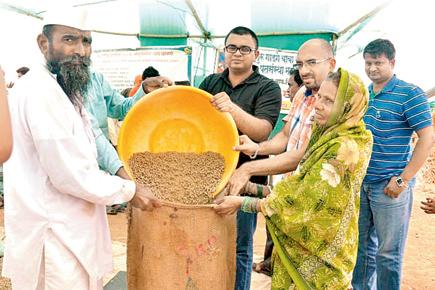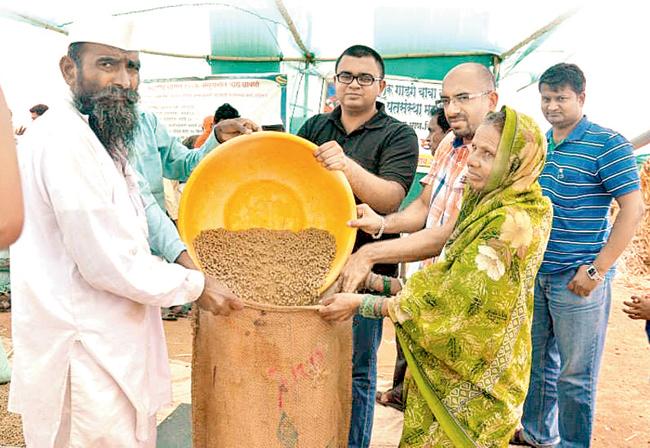Created in 2013, soon after Maharashtra was hit by drought, The Drought Help Group, a Facebook group was set up to connect donors across cities with needy people in drought-affected areas

Drought Help Group
Today, over 10 crore Indians are part of Facebook. And while most use the social networking site to stay connected with friends and family, a group of social entrepreneurs recently proved that social networking can also help connect the needy to those who wish to help. The Drought Help Group, a Facebook group created after drought hit the state of Maharashtra in 2013 (the worst in 40 years), managed to generate R85 lakh from donors in Mumbai and Pune, and provide it to the needy in the drought-hit areas in Maharashtra. The group, was recently selected as one of the ten Facebook Stories by the social networking website for their extensive work. the guide caught up with the group’s mentor, Ravi Ghate, to share their journey.
ADVERTISEMENT

Members of The Drought Help Group donating grains to a drought-affected family
Q. How did the Drought Help Group start? How big is the group now?
A. In 2013, there was a severe drought in the state of Maharashtra, the worst in 40 years. Reports of deaths and scarcity of drinking water in those areas prompted us to create a Facebook Group. We started the group to build a network and appeal to people to join our efforts. Our group members identified friends in the drought-affected areas as local volunteers for local level co-ordination. They helped us with the data of the required quantity of water storage tanks, water tankers, cleaning and widening of canals, and other needs. We tied up with donors in urban areas mainly in Pune and Mumbai, who wanted to provide funds and help with resources for these projects. The group has 10,500 members with additional core group of 105 professionals from different fields like IT, construction and pharmaceuticals among others.
Q. You could have easily formed an NGO, but you decided to go ahead with a group on a social networking website. Why?
A. We chose this model in order to use IT as a tool to eliminate the middleman. Forming an NGO would have consumed 40% of the gathered funds in infrastructural set up. We saved it by creating a Facebook group, thereby acting as a catalyst and link between the donors and the beneficiaries. The group had decided to not touch a single Rupee while extending the help; the model was designed in such a way that the donors could donate in kind such as grains, water tanks, and any other thing, directly to the beneficiaries.
Q. When people were contributing, they would have also wanted to see how their help was implemented. How did you convince people that the funds were utilised properly?
A. We posted the photos of the donors and victims receiving the aid on the page in order to authenticate the entire programme and also bring about total transparency in our operations. Besides, we were co-ordinating in offering the help directly to the needy villages. People liked this approach and helped us raise a total of R85 lakh in funds as well as in kind. Our efforts helped nearly 10 lakh people from seven districts of the state. Today, they have drinking water provisions till the next rainfall. The group was also instrumental in ensuring water for farming and fodder to help save cattle and wild animals.
Q. Your work has been appreciated nationally, and now with Facebook Stories, you have attained international reputation. But you guys are not operational anymore. Why share your story now? What’s the future plan?
A. Before the FB stories happened, the group received the prestigious Manthan Award for Social Media and Empowerment. We had decided not to continue our operations after the publicity, but we were not against sharing our story, as our story could inspire others and also authenticate our social experiment. So, when Facebook representatives approached us to share our story, Jaideep Pathare, one of the core group members, wrote it for them. As for future goals, the group was formed to address a problem that came in its way. Now, we want to expand this movement and work for water conservation on a large scale. We are working on how this model can be replicated to serve other causes or make this model work at other locations. The groundwater table is depleting everyday. Borewells need to dig deeper, but without much success. We want to work on an international level, seek expertise and donors to reach to the villages to recharge the groundwater table. We are working on it and soon, we will come up with a viable model.
 Subscribe today by clicking the link and stay updated with the latest news!" Click here!
Subscribe today by clicking the link and stay updated with the latest news!" Click here!






